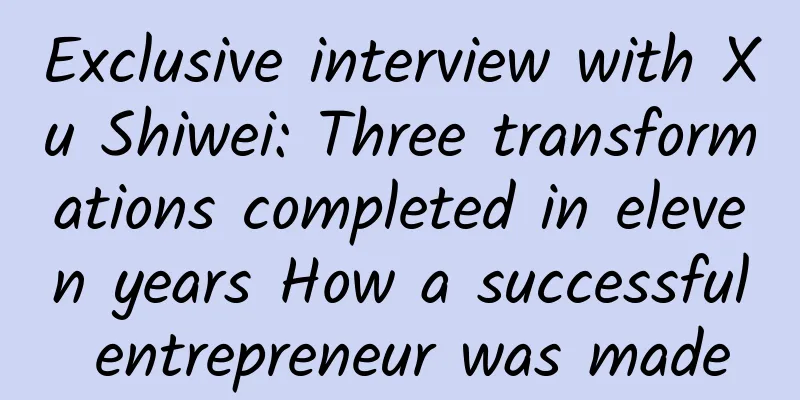Exclusive interview with Xu Shiwei: Three transformations completed in eleven years How a successful entrepreneur was made

|
Introduction: Xu Shiwei, CEO of Qiniu Cloud Storage, a leading figure in the domestic Go language circle, and the founder of the ECUG community. Everyone who comes into contact with him will feel that he is a silent and introverted person. Most of the time, he just listens quietly, like a low-key bystander, and sometimes makes limited supplements with brief opinions and views. This is his side. In the course of his career, Xu Shiwei uses three stages to tell us: everyone's circumstances are different, and when faced with choices, people deal with them in different ways, thus forming different but wonderful lives. The first stage was from 2000 to 2006, when he started working in Kingsoft as a technician to develop WPS. Xu Shiwei spent 6 years at Kingsoft to complete a long opening. At that time, due to rampant piracy in China, WPS was in a sluggish situation and had been on the verge of survival. In addition, he was eager to see the outside world, so he proposed to resign. However, Lei Jun came forward to retain him and supported Xu Shiwei to establish Kingsoft Labs, imitating Google culture to introduce the concept of 20% free time, and also promised to invest no less than 5 million yuan in Kingsoft Labs every year. In the end, Xu Shiwei chose to stay and prepare for Kingsoft Labs. The second phase started in 2007. Perhaps Xu Shiwei wanted to break away from Kingsoft's product line at the time and be able to do his own thing without constraints, so they did something unique in Kingsoft Labs: cloud storage. At that time, no company in China was doing cloud storage, and they were the first. At that time, Amazon AWS had just started, but no one in China knew about it, including Xu Shiwei and his team. Doing cloud storage was actually a coincidence. At that time, Xu Shiwei was working on a search engine, and the search engine had to scrape web pages and save them, so it was necessary to contact and apply storage. At that time, it just felt more interesting, so it was positioned as a direction to dig deeper, and these things were done in Kingsoft Labs. At that time, they were working on crawlers and storage in Kingsoft Labs. Xu Shiwei told reporters that crawlers are used to make storage more practical so that it can be implemented. Otherwise, his project would be like a castle in the air. So they cooperated with Kingsoft Antivirus, which happened to have a Mercury Project. This is also what all antivirus software manufacturers are doing, which is to pull down all executable files (EXE) on the Internet, and then put them in their own environment to analyze whether there are viruses and then issue warnings. From this time on, Xu Shiwei suddenly realized that he had a very important transformation, that is, he not only had to do technology, but also had to carefully consider how to make a product well. Later, the company gradually became shaken internally, and they had no choice but to move on. In 2009, Xu Shiwei joined Shanda Innovation Institute to work on cloud storage, mainly for the storage of Shanda Literature data. Soon after, he developed Shanda Netdisk for end users. This product was later merged and became the current Shanda Cloud. However, with the operation of the capital player Chen Tianqiao, Shanda sold its game business and transformed into an investment holding company. Therefore, under the strategic layout set by Shanda’s senior management, Xu Shiwei felt that he had deviated from his preset development track. The third phase started in June 2011, when Xu Shiwei resigned from Shanda to start his own business and founded Qiniu Cloud Storage. In the first three months, their team also made a product similar to a network disk, but the current product is different from a network disk. It is mainly for development storage. The product has no interface and only stores files through API calls. Xu Shiwei said that the whole process should be said to be a painful direction exploration. From 2007 until October 2011, they were determined to do storage for development. The main reason was that their team was all developers, so they understood the pain points of developers very well. As a person who changed from a product developer to an entrepreneur, Xu Shiwei may have felt that it is better to build his own platform than to place his ideas on someone else's stage. In his 11 years of experience in a large company, the change of roles from technician to product person and then to CEO made him firm in his idea, which is to focus on storage technology as the core product direction. It is also the case that a person who pursues excellence in technology has transformed his role and has made his own way in the fiercely competitive cloud computing industry by becoming the leader of Qiniu Cloud Storage. In these legendary experiences, how does he think and manage at work? After 11 years of self-exploration, how does he manage his team and the culture behind it? And what are his insights on the current status of cloud storage and other fields? With these questions, the reporter had the honor to interview Xu Shiwei himself at the WOT Summit.
Note: The following is a transcript of the interview, with some of the content edited. ________________________________________ Reporter: The success of Qiniu Cloud Storage is closely related to your participation and decision-making. What role and management style do you generally play in the entire team? Xu Shiwei: I always think that I have two more important things in the company. The first is to control the product direction. What should we do and which direction should we go in the future, so I think the CEO must first become a top product officer. The second is the company's operating efficiency. I will pay attention to where the bottlenecks are in the entire company's system, and look for various ways to solve them. Among them, R&D efficiency is what I pay most attention to. Because R&D products are the first link in production and the foundation of a company's survival, but the entire system is not only R&D, but also marketing, sales, and customer service systems, so we will carefully discover and dig out some bottlenecks. I also think of myself as the company's top headhunter, supplementing talents when necessary. In the early days, I spent more time on products and technology, and later I gradually shifted my focus to personnel-related functions. Reporter: Do you think there is anything that needs to be improved in management at present? Xu Shiwei: I should say there are many. After all, the management of a startup is definitely the most rough. The management of a startup is a process of continuous optimization and improvement of the entire operating system. In the management process, order and chaos are a pair of contradictions: all order is transformed from chaos to order, but when chaos becomes order, it sometimes curbs innovation, and you must follow certain rules. There are still many problems we need to improve. I think the overall improvement idea is this: first, we need to focus on finding the current major bottlenecks. If these bottlenecks are not standardized, they will cause chaos in the development of the entire company. Then, we need to formulate corresponding strategies to improve them. The goal of so-called management should be to improve efficiency, not to reduce efficiency. I don’t think it is necessary to allocate management energy to places where there are no problems. Our idea is to let go as much as possible and strive for greater autonomy for employees. Reporter: There are many directions for cloud storage, why do you focus on image storage? Xu Shiwei: Actually, it is to narrow the direction of the product. The advantage of narrowing is that you can focus on a certain field and impress users. Because the functional requirements are simple, we have more time to dig deeper and analyze the data with the most users. In 2010, it was pictures, so we decided to do in-depth research on pictures. At the same time, we need to consider in what scenarios users will use pictures and what their needs are usually. Later, we found that thumbnails are the needs of almost all customers, so we will do a good job of thumbnails. Later, we will go deeper into watermarking and format conversion, and naturally there will be some picture-oriented functions. At the end of 2011, we had a video client whose main business was to make baby diaries. This contained many baby pictures and videos. At that time, we started to support videos, but we didn’t really understand what the client’s needs were. The first thing we proposed was format conversion, because videos shot on Android could not be played on iPhone. Later, the demand for video increased because it was streaming media. Video is actually very complex. It has two major needs: live broadcast and on-demand. I think the most common demand for on-demand is to capture a certain frame of a video and then string together multiple videos to form a larger video. As our business develops, there are now more than a dozen video APIs and more than a dozen image APIs, which together are nearly thirty. Reporter: Online education exploded in 2013 and became one of the hottest investment projects. Will Qiniu provide support in this area? Xu Shiwei: The growth in demand for online education has had a significant impact on video storage, and the number of videos has increased significantly. At the beginning, we focused on pictures because the demand for videos was relatively low. At the end of 2012, we clearly saw the trend towards videos. At the beginning of 2012, images accounted for more than 90% of our storage. But by the end of 2012, the storage ratio of images and videos was about 7:3, almost at the same order of magnitude, and the increase in video was faster than that of images. It was soon discovered that in terms of storage capacity, videos might surpass images, which was a change in industry trends. Reporter: What kind of changes do you think will happen in the field of cloud storage in the next two years? Xu Shiwei: Qiniu is currently ranked first in the cloud storage field. I believe that in the next two years, Qiniu's position in the cloud storage field will continue to be consolidated, and its advantage over its peers will gradually widen. Qiniu's own development requires careful thinking and changes, so what should we do next? How to do it? In summary, it is consolidation and optimization. First, we will continue to strengthen the quality of our storage business and consolidate our leading position. In addition, we will think about the future direction. Reporter: In fact, in terms of corporate culture, we believe that whether it is a startup or some traditional companies, such as HP and Alibaba, they all have their own corporate culture. What do you think are the biggest characteristics of Qiniu in this regard? Xu Shiwei: Qiniu's corporate culture can be summarized as a geek culture. First of all, the company has fewer constraints, and the goal is to create employees' imagination as much as possible. At the same time, I will optimize the company's operational efficiency, such as studying the R&D system. In fact, the optimization of R&D efficiency is very important, but it is ignored by many companies. Everyone knows the technology developed by Qiniu. We have chosen a very novel field, and the R&D system also has many innovations. First of all, we are very actively engaged in and accept the use of cloud services. We use a lot of third-party clouds in our R&D system and position ourselves as a cloud service division. The entire company's operation process is a natural link in the company's cloud ecology, so we use a lot of cloud services, including product R&D and testing. We will build the entire company's operation in a cloud ecosystem to the greatest extent possible, outsource as much as possible, and use all our energy to focus on our own business development. Try to reduce your burden as much as possible and concentrate on improving your core competitiveness. I think this is a more geeky part. Reporter: In the nearly four years of development of Qiniu, what are the things that have impressed you the most, whether in terms of technology, management or the entire market? Xu Shiwei: The most important change for Qiniu is the transformation from online disk to cloud storage. At the beginning, we made personal online disk, named Q disk, and launched it. Unfortunately, Tencent also launched a Q disk later, so we only worked for three months before we started the transformation. Later, we were determined to focus on cloud storage. Another thing is that we did not pursue as many services as possible to be supported by third parties at the beginning, and gradually expanded our own process. Because we still did integration testing on the server very early, and all the testing links were completed by ourselves. Until one day, I decided not to complete these capabilities myself, and completely rely on third parties for support. So we gradually formed a habit of letting others do it. At the beginning, there were a small number of users, and gradually more and more, and the whole cloud ecosystem became a whole. Maybe some things are not a mutation, but a process of quantitative change to qualitative change. The third is code hosting. I think Qiniu has been aware of this for a long time. It is rare for Internet companies to put the source code with others. We are different from most Internet companies. Many people think that source code is their lifeline. Therefore, we think trust is very important, because no company can really produce independently. And in my opinion, source code is not as important as imagined, nor as scary. Be confident in yourself, because if he chooses to follow you, it is impossible for him to surpass you. ***, Qiniu attached great importance to the Go language during development. Qiniu's culture is that when using a language or a tool, you have to understand why you want to use it and evaluate its maturity. So Qiniu uses "GO" not because "GO" is a cool thing, but because it has done a very rigorous evaluation of it, so it is believed that it can meet our needs and is mature enough. It may evolve in the future, and it has met my expectations in my evaluation criteria, so I will choose it. In the selection of technology, we cannot just seek novelty, but see what can really solve our company's problems and solve them in a relatively more efficient way. This is the core of the "geek" culture. Reporter: You just said that when using the GO language, I understand that you must have spent a long time in the early stages doing relevant research or testing. Xu Shiwei: No, this may be something that many people find strange. It only took us half a month to decide to use GO for development. I wrote GO code for half a month, and then decided to use GO. It seems a bit hasty, but it is very natural to me, because your research on something is actually related to your familiarity with the field. The less familiar you are with it, the longer you will spend on researching it. The key is that I am very familiar with the field of GO, so half a month of research time is more than enough. Reporter: If you have another chance to start a business, which direction would you consider going? Xu Shiwei: Actually, there are a lot of opportunities. I think I will seriously evaluate my own strengths and abilities, and then decide which field I am most suitable for, which group I understand best, and then decide who to serve. So from my perspective, the second entrepreneurial point is a different identity. First of all, I am already a developer, a product person, and an entrepreneur. In this context, my entrepreneurial options will be wider than before. I will not just be a developer, I can serve any company. I think the pain points of any company may become the accumulation of my next startup. So, what bottlenecks do I think startups are facing now? The first one is recruitment. Talent is hard to find, so recruitment may be a possibility for me to start a business. The second possibility is education. I just mentioned that the competition for talent is very fierce. I need to create more reliable IT technicians to solve the current talent gap. This can also be a starting point. The third possibility is customer service. Reporter: Customer service? Xu Shiwei: It's strange, right? I think the customer service system of startups is actually a big pain point. To put it another way, I may make customer service no longer a problem for all companies in the future, and this may also be the starting point for entrepreneurship. In short, I am relatively familiar with it, and I think I can play with it in a variety of ways. I haven't thought about what kind of tricks I can play with each of these points. If I really want to start a business, I will definitely think carefully about what kind of fun things I can make with each point. As long as I think clearly, I can do it. That's it. Regarding recruitment, I think the biggest difficulty for startup teams is recruitment. Today's headhunting companies are too traditional, so they are likely to be disrupted. First of all, they don't serve too many startups. I think the biggest change in headhunting is that in the past, headhunting was to find high-end talents for giants, but that was the definition of headhunting in the past. I think the definition of headhunting in the next ten years is to find ordinary technicians or even interns for startups. I think that in the next ten years, the startup support or enterprise service market will be a very large market, and headhunting is definitely a very important market. Now all headhunting companies are facing the risk of being overthrown. If someone figures out what a new headhunter should do, there will be a lot of fun things in it. Reporter: Qiniu’s storage products are already very mature. Have you considered entering other fields? Xu Shiwei: I just mentioned that Qiniu will rethink what we should do next. This does not mean that we will start a second business, but what exactly does Qiniu do. Storage is just our first entry point. Of course, one day we will break through the Qiniu cloud storage brand, but we will definitely not suddenly turn around and do headhunting. It must be a direction that has a linkage effect with storage. The expansion is to consolidate Qiniu's position in the storage field, not that Qiniu suddenly started a new business that has nothing to do with the original business. If I want to strengthen my original core competitiveness, then I will not weaken the business that I dominate in this field. If you do a completely different business, it will directly weaken your original capabilities. In addition to being distracted, you will also have to recruit technical personnel, which is actually not worth it at this time. |
<<: Android source code download: APP startup guide
Recommend
The New Year is full of flavor. Teach you how to cook perfect dumplings
What are the must-eat foods during the Spring Fes...
Wake up to a hardened skin from a hot water bottle? Beware of the "low temperature killer"!
Have you ever relied on the warmth of a hot water...
What? Krill are not shrimp?
Antarctic krill (scientific name: Euphausia super...
The price of OneCoin will appreciate in 2020. What is the estimated price of OneCoin in 2020?
OneCoin price appreciation in 2020 What is the es...
Three companies compete: China Telecom is struggling, China Unicom is losing
China Unicom recently released its latest user da...
Special: 30 pictures, farewell to 2023
This article was created by Planning | Ren Bingxu...
How to market local restaurants?
A noodle shop that doesn't engage in fancy ma...
Many "ghost plane" incidents are related to decompression
On the afternoon of September 4th local time, a s...
Can “Glucosamine” really save your joints, or is it just a waste of money?
A friend told Huazi that her mother had severe kn...
Tips on how to choose a 400 number when applying for one
Now there are many companies that need to apply f...
Do insects feel pain?
Author: Gao Qi Reviewer: Yin Haisheng (Shanghai E...
The moon is shrinking all the time. Will it shrink into the size of a raisin?
Produced by: Science Popularization China Author:...
Tesla Model 3 will be the first to adopt innovative glass technology
Recently, according to US media reports on Novemb...
Fine-tuned operations: How to provide good user subsidies?
" Subsidy " is a common operating metho...
Strategies and methods for operating hot products on Xiaohongshu
We love and hate Xiaohongshu . What we love is th...









